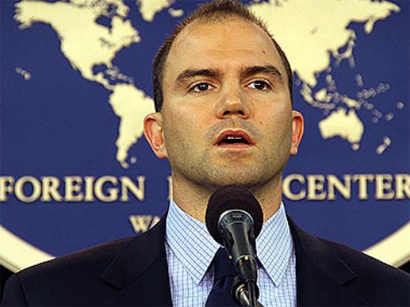The United States will begin sending military assistance to the rebels in Syria after its intelligence services confirmed that chemical weapons have been used in the conflict, the White House said Thursday, dpa reported.
US President Barack Obama has decided to provide direct support "that has military purposes" to the Syrian Military Council (SMC) based in part on the finding that chemical weapons have been used.
"Our intelligence community now has a high confidence assessment that chemical weapons have been used on a small scale by the Assad regime in Syria," the White House said in a statement. "The president has said that the use of chemical weapons would change his calculus, and it has."
An assessment conducted by US intelligence organizations shows that the nerve agent sarin was used and between 100 and 150 people have died in the attacks.
While the deaths make up only a small portion of the more than 90,000 deaths in the war, "the use of chemical weapons violates international norms and crosses clear red lines that have existed within the international community for decades," the White House said.
Deputy White House spokesman Ben Rhodes told reporters in a conference call that the additional support for the rebels would be substantively different from what the US now sends. He said it would be aimed at strengthening the effectiveness of the SMC on the ground.
Rhodes said he could not provide every detail about every type of support, "but suffice to say it's important to note that it is both the political and the military opposition that will be ... receiving US assistance."
The US will consult and cooperate with other countries in the region, including Jordan, Saudi Arabia, the United Arab Emirates and Qatar, Rhodes added. It also will be consulting with European allies such as Britain, France and others about the best way to support the Syrian opposition. US Senators John McCain and Lindsey Graham said they agreed that the finding about chemical weapons must affect US policy toward Syria.
"The President's red line has been crossed," McCain and Graham said in a joint statement. "US credibility is on the line. Now is not the time to merely take the next incremental step. Now is the time for more decisive actions."
"A decision to provide lethal assistance, especially ammunition and heavy weapons, to opposition forces in Syria is long overdue," they said, adding they hoped Obama would take this that step.
They also urged Obama to rally an international coalition to take military actions to blunt Bashar al-Assad's ability to use airpower and ballistic missiles and to move and resupply his forces.
Fighting in the country has shown no sign of abating. At least 93,000 have been killed in the war, the UN human rights office said Thursday.
The death rate has risen to an average of 5,000 per month since July last year, according to the estimate, which includes only documented killings.
The office's previous estimate stood at 60,000, as of late November, while UN General Assembly President Vuk Jeremic had talked of 80,000 deaths in May.
The real fatality figure, however, could be much higher, as 38,000 unverified deaths have not been included in the latest estimate.
"The constant flow of killings continues at shockingly high levels - with more than 5,000 killings documented every month since last July, including a total of just under 27,000 new killings since 1 December," UN High Commissioner for Human Rights Navi Pillay said.
Civilians have borne the brunt of the conflict, which started with peaceful anti-government protests in March 2011, according to the report.
"This extremely high rate of killings, month after month, reflects the drastically deteriorating pattern of the conflict over the past year," Pillay said in Geneva.
Inside Syria, meanwhile, rebels attacked the Damascus airport, reported state media and the opposition. The pro-opposition Syrian Observatory for Human Rights said rebels, fighting to oust al-Assad, targeted the airport with home-made rockets.
Elsewhere, rebels seized a major military base in the central province of Hama, a significant gain for opposition forces after recent losses, reported the Britain-based Observatory.
It added that regime troops were shelling the base, which is located on the outskirts of the town of Morek, near a highway linking Damascus to Aleppo.
Al-Assad's troops, backed by the Lebanese Shiite Hezbollah movement, last week retook control of the strategic town of al-Kussair in the central province of Homs.
Recent battleground gains have boosted the morale of regime forces, who are reportedly pushing to regain other rebel-held areas.






